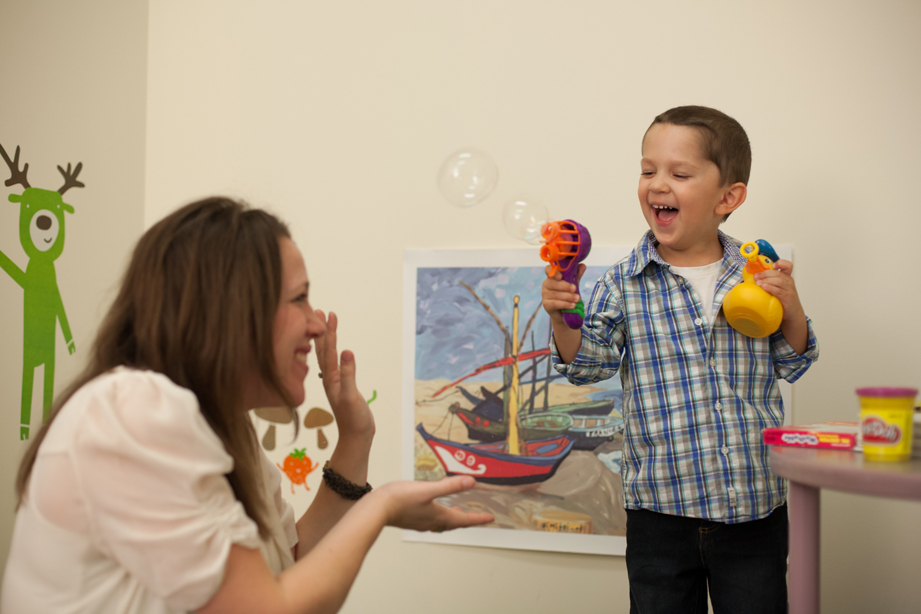Through its 13-year history, KBHN has established a track record as an internationally recognized evidence-based multidisciplinary network that generates and mobilizes critical knowledge and innovation most relevant to communities and families. Working with partner organizations, KBHN research teams have created numerous innovation outputs, including policy documents, commercial products, copyrights, license agreements, new clinical practice guidelines, and training packages.
The initial Cycle III research projects were identified based on evidence of efficacy and the presence of appropriate implementation partners. Each project was provided with support from KBHN central administration in the principles of implementation science, an emerging and rapidly evolving field which focuses on how effective interventions are disseminated and implemented across the spectrum of contexts and settings in order to become embedded into routine practice to improve individual and population health.
Funded through a competitive application process based on the probability of achieving impact through research excellence, five New Implementation Projects (IPs) were selected from KBHN’s pipeline of research that originated in Cycle II.
KBHN conducted an open competition for new research initiatives under the umbrella of the Strategic Investment Fund (SIF) which resulted in 21 submissions, from which the five strongest applications were funded through a highly competitive process. Importantly, the SIF projects were required to bring external partner financial support that matched the NCE contribution at least 1:1, and also include family/patient stakeholders as members of the research team.
Previously funded projects overview
Cycle I – Building the Network
The Kids Brain Health Network (KBHN) was established in 2010 as an interdisciplinary network of researchers and clinicians to address fundamental questions of early brain development with the specific goal of mobilizing this knowledge to improve the lives of children living with neurodevelopmental disabilities and their families. The initial research projects funded by KBHN focussed on the interaction between genes and the environment. This knowledge has led to a better understanding of the origins of three highly prevalent neurodevelopmental disabilities, namely Autism Spectrum Disorder (ASD), Cerebral Palsy (CP), and Fetal Alcohol Spectrum Disorder (FASD).
In mid-Cycle I, a Strategic Advisory Committee of stakeholders knowledgeable about research, training, and knowledge translation supported a board-led strategic planning process. This process’s key outcome was to shift the focus of KBHN’s research programs toward application-based research.
Cycle II – Strengthening Connections
Cycle II was characterized by incorporating new cross-cutting themes that expanded the scope of the Network’s activities. More specifically, to promote change for children with neurodevelopmental disabilities and their families, attention was focused on the child’s critical role and family’s social environment as a predictor of outcomes. Also, new initiatives were introduced to address issues that are common across virtually all neurodevelopmental disabilities. These include comorbidities such as sleep disruption and the fragmented systems of support that families struggle to navigate.
Evaluating a New Training Program for Families and Service Providers
F-Words Training Project Summary: Functioning, Family, Fitness, Fun, Friends, [...]
A New Family-centered Ecological Model in Autism Services
Challenge Many autistic children experience high levels of emotional [...]
Empowering Children to Achieve Power Mobility with Brain-computer Interfaces
Challenge Thousands of Canadian children living with severe physical [...]
Working with Families of Infants at Risk of Speech and Language Delay
Challenge Imagine worrying that something is not quite right [...]
Implementing a Collaborative ACT Intervention for Family Caregivers
Challenge Family caregivers of people with neurodevelopmental disabilities (NDDs) [...]
Expanding the Reach of Social ABCs
Challenge There are few interventions targeted at children three years [...]
Making Math More Accessible to All
Challenge Math presents a steep challenge for many school-aged [...]
Mapping FASD Supports for Each Child’s Life
Challenge Every person with Fetal Alcohol Spectrum Disorder (FASD) [...]
Field-Testing an Intelligent Sound-Sensitivity Device
Challenge Many children living with autism spectrum disorder (ASD) [...]
Enabling Early Detection and Intervention for Cerebral Palsy
Challenge Doctors should ideally diagnose cerebral palsy (CP) before [...]
Supporting the Mental Health of Kids with Autism
Challenge Kids with autism commonly struggle to regulate their [...]
The Infant and Early Mental Health Hub for Training, Resources, & Tools (IEHMF Hub)
Challenge Awareness about infant and early mental health among practitioners [...]
Working Towards a Better System for People Living with Neurodevelopmental Disabilities
Challenge While every neurodevelopmental disability (NDD) has its unique [...]
Better Nights, Better Days: An Online Intervention to Help Children with Neurodevelopmental Disorders to Sleep Better
Challenge Children with neurodevelopmental disorders (NDDs) often struggle with sleeping, [...]
Dino Island
Challenge Children with neurodevelopmental disabilities often struggle because of deficits [...]
Fetal Alcohol Resource Program
Challenge Accessing supports and services for FASD can be very [...]
Early Identification of Infants and Children with FASD
Challenge Identifying children who are at risk of FASD early [...]
The New Physical Activity Coaching (New-PAC) intervention
Challenge Physical activity is beneficial for all children but has [...]
Secret Agent Society
Challenge Kids with autism commonly struggle to regulate their emotions [...]
Finding a Way to Diagnosis Cerebral Palsy Sooner
Challenge When it comes to neurodevelopmental disabilities, early diagnosis is [...]
Developing a Community of Practice (CoP) to Support Broader Implementation of the MILE Program
Challenge Math presents a steep challenge for many school-aged children, [...]
Intelligent Solutions for Sound Sensitivity in Children with Neurodevelopmental Disorders
Challenge Many children living with autism spectrum disorder (ASD) are [...]
Providing Clear, Evidence-Based Recommendations for Individuals with FASD
Challenge Following an FASD diagnostic assessment, individuals will receive a [...]
Analyzing Cells to Better Understand FASD
Challenge The ability to better characterize the cellular mechanisms underlying [...]


























